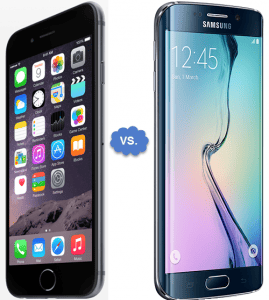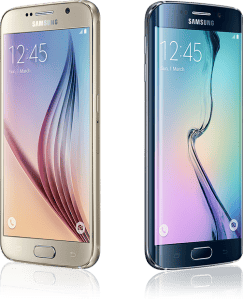Smartphone Switch?
 Smartphone Switch? A reader asks…
Smartphone Switch? A reader asks…
Hi Chris, I have an iPhone 5 and am now eligible to upgrade to the new iPhone 6 without having to pay full price. But I’m reading reviews of the new Samsung Galaxy S6, and it’s looking like that is better than the iPhone. Should I make the switch?
You certainly could, but let’s take a look at some factors to consider before you decide. I previously wrote about the subject of switching in this article, so let me just boil that down to just this question:
How ‘vested’ are you in the Apple ecosphere – apps, library of music and other media, and how much work are you willing to put into getting everything you can transferred over to Android/Google?
The answer to this is probably the most critical point to consider. If you have an extensive library (music, movies/videos, podcasts, apps), then it will most likely be a lot of work to transfer what you can, and you’ll have to leave some things behind. Also, Android versions of many popular apps are not as polished as their iOS versions. Also if you have other Apple devices (Mac, iPad, Apple TV, Apple Watch), then switching your smartphone to Android becomes less attractive. If none of this bothers you, then other questions you might ask yourself are:
 How comfortable and satisfied are you working in Apple’s iOS world and how willing you would be to learn different ways to do things, i.e., how easily do you accept what could be a major change in your virtual life?
How comfortable and satisfied are you working in Apple’s iOS world and how willing you would be to learn different ways to do things, i.e., how easily do you accept what could be a major change in your virtual life?- Are you happy with what Apple’s given you with iCloud backup and storage? Or frustrated and ready for a change?
- What’s your comfort level with the security of your digital life – are you willing to take extra steps to protect your Android part (something you haven’t had to worry about with Apple)?
- How do you feel about the companies that each represents? For the iPhone, it’s only Apple Inc. For the Galaxy, it’s both Samsung and Google.
Anyone using either smartphone’s operating system for any length of time will get used to how it works, so switching over to a different system will take some getting used to. If you are comfortable with change, that may not be a problem. And if you consider your smartphone to be an extension of yourself, if you are ‘addicted’ to your smartphone and use it dozens of times a day (or more), then you should consider whether it’s worth making a change.
 Apple iCloud isn’t perfect, but then neither is anybody else’s – they all have their quirks. If you have been bothered or frustrated with iCloud, this might be a vote for making a change. If you’ve not really worried about this or even thought about it, then it really doesn’t vote either way. Or perhaps if you’re comfortable with iCloud, then you might cast a vote for sticking with what you have and know.
Apple iCloud isn’t perfect, but then neither is anybody else’s – they all have their quirks. If you have been bothered or frustrated with iCloud, this might be a vote for making a change. If you’ve not really worried about this or even thought about it, then it really doesn’t vote either way. Or perhaps if you’re comfortable with iCloud, then you might cast a vote for sticking with what you have and know.
 It’s pretty much a given that Apple offers the best security that you can get. Forget about everything you’ve heard or read, security always boils down to how good you secure your digital life (username, password, pin, etc.) and imo everything negative you’ve heard about Apple’s security has had to do with the user’s lack of security, not the system. For Android, that’s another matter – it’s well-documented that Android-based systems are less secure, and require you to add on security features and practices to keep your smartphone (and digital life) safe.
It’s pretty much a given that Apple offers the best security that you can get. Forget about everything you’ve heard or read, security always boils down to how good you secure your digital life (username, password, pin, etc.) and imo everything negative you’ve heard about Apple’s security has had to do with the user’s lack of security, not the system. For Android, that’s another matter – it’s well-documented that Android-based systems are less secure, and require you to add on security features and practices to keep your smartphone (and digital life) safe.
Company reputation can be considered – in my opinion, Google is all about capturing information about you in order to make money whereas Apple charges you a premium price for the devices they sell, and scrupulously safeguards information about you. I’m unsure about Samsung – they’ve had a history of loading crapware onto their devices and have been very lax about pushing out operating system updates to owners of their devices.
You can also consider price, but I’d temper that with the above, it always seems to me that the more the price is creatively complicated, the more it actually costs the customer, or the worse value the customer actually gets. And most people don’t bother to look at the total cost of ownership over the life of their choice – when you count the cost of 2-years worth of smartphone voice, text and data service you’ll pay for no matter which you choose, the up-front cost isn’t really that important. Either way, you’ll be spending upwards of $2,000 (or more) for having one of the worlds’ best smartphones for the next 2 years.
 I will go so far as to say that I think the Samsung Galaxy S6 is currently the best Android-powered smartphone on the planet, and that it is relatively on par with the iPhone (and in a few cases, slightly exceeds the iPhone 6’s capabilities). But the real differences between the iPhone 6 and the Galaxy S6 are minor and I wouldn’t consider any to be a factor worth giving much weight to – compared to the questions above. For example:
I will go so far as to say that I think the Samsung Galaxy S6 is currently the best Android-powered smartphone on the planet, and that it is relatively on par with the iPhone (and in a few cases, slightly exceeds the iPhone 6’s capabilities). But the real differences between the iPhone 6 and the Galaxy S6 are minor and I wouldn’t consider any to be a factor worth giving much weight to – compared to the questions above. For example:
- The Galaxy S6 charging time has been reviewed as being faster than the iPhone 6, but that’s with the stock charger – with a higher-power charger (such as the iPad’s), iPhone 6’s charge a lot faster
- The higher resolution of the Galaxy S6 (2560 x 1440 resolution at 577 pixels per inch) versus the iPhone 6 (1334 ×750
resolution at 326 pixels per inch) sounds important, but the size of the screens are so small that it really doesn’t matter. HD video (1080p or 1920 x 1080) really doesn’t matter on screens smaller than about 32 inches. Smaller screens really don’t matter that much to the human eye once you get to the level that Apple’s Retina display offers unless your eye is an inch or so from the display. There are so many other variables to consider (such as contrast, backlighting, brightness capability, black capability, etc.) that simple resolution measurements are no better at determining overall quality than pixel density is to a digital camera. - Speaking of digital cameras, the Galaxy S6 has that higher pixel count (16 megapixels) versus the iPhone 6’s (8 megapixels) but preliminary testing shows that the iPhone still takes slightly better pictures than the Galaxy S6. They’re close enough to not really matter except to photo-hounds (who will be using a DSLR anyways).
- A lot of ‘new’ features really aren’t going to matter except to a few enthusiasts – the ‘edge’ display on the Galaxy S6, fingerprint reader (and the forthcoming Samsung Pay to counter Apple Pay), the twice-click-to-get-to-camera on the Galaxy S6 (versus tapping the photo icon on the iPhone), etc. In actual practice, most people aren’t going to use more than a small percentage of the features available on any smartphone, and the main features everybody uses are very well optimized on both the iPhone 6 and the Galaxy S6.
The rest of the specs really don’t matter – storage space is less important now that most of your data can easily reside in the cloud, neither storage space nor batteries are user-replaceable on either. Everything else is so close as to not matter. Samsung took an awful lot of what’s best about the iPhone 6, so the Galaxy S6 obviously looks and feels very similar. Where the difference may matter is within the operating system and the apps. There I think it really comes down to personal preference. If you’ve always been an iPhone user, then switching to an Android-powered device is going to seem strange, just as vice-versa. So personal preference and readiness to change matters more than anything else in my opinion.
Hopefully you’ve read this far and have now figured out whether to go with an iPhone 6 or the Galaxy S6. Either choice will get you a superior smartphone well able to handle the mobile aspects of your digital life. If you do decide to switch to the Galaxy S6, please read this article for tips on how to make the switch easier. Please feel free to comment with any other thoughts you have about this decision.
This website runs on a patronage model. If you find my answers of value, please consider supporting me by sending any dollar amount via:
or by mailing a check/cash to PosiTek.net LLC 1934 Old Gallows Road, Suite 350, Tysons Corner VA 22182. I am not a non-profit, but your support helps me to continue delivering advice and consumer technology support to the public. Thanks!
 How comfortable and satisfied are you working in Apple’s iOS world and how willing you would be to learn different ways to do things, i.e., how easily do you accept what could be a major change in your virtual life?
How comfortable and satisfied are you working in Apple’s iOS world and how willing you would be to learn different ways to do things, i.e., how easily do you accept what could be a major change in your virtual life?





